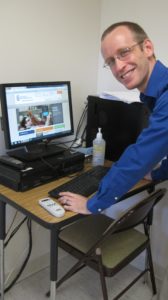Sushma Subramanian Speaks About Book and Article on Podcasts

Associate Professor of Communication Sushma Subramanian
Associate Professor of Communication and Digital Studies Sushma Subramanian has appeared on several podcasts to talk about her book How to Feel: The Science and Meaning of Touch and her article, “Who Gets the Child?,” which ran in The Washington Post.
Subramanian Article Published in Washington Post Magazine

Assistant Professor of Communication Sushma Subramanian
Assistant Professor of Communication Sushma Subramanian penned an article for Washington Post Magazine entitled, “States are increasingly considering equal shared parenting in custody cases. This young Kentucky couple serve as a test case.”
Judge Brent Hall had some stern words of advice for the young couple seated before him at Hopkins County Family Court in Madisonville, Ky. Jordan Pyles and Ashlyn Harrell had come to make some small adjustments to a temporary custody arrangement for their 4-year-old daughter, but on this March afternoon in 2018 what preoccupied them was their upcoming trial in June. Pyles, a 25-year-old project manager at a steel manufacturing company, and Harrell, a 22-year-old full-time mom, were both hoping to win sole custody.
“I care about your child because I care about kids,” Hall said of the trial, which he would also be presiding over, “but I’m going in blind, and you are going to have a very limited period of time to tell me and try to get something to click in my mind that makes me see things your way. . . . And I’m probably not going to see it your way, either one of your ways.” Read more.
Subramanian Publishes Story in Truly Adventurous

Assistant Professor of Communication Sushma Subramanian
Assistant Professor of Journalism Sushma Subramanian wrote an article for Truly Adventurous entitled, “Queens of Kasekela.” The piece follows the life journey of Gremlin, a chimp Jane Goodall originally observed, as she rises to power in her Gombe National Park community, and is an experiment in nonfiction storytelling using animals as main characters. View on Medium.com.
Mary Talks: Adrienne Brovero, Dec. 15 at 7:30 p.m.

Join us ONLINE for the next Mary Talk of the 2021-22 academic year!
We will hear from Adrienne Brovero, director of the nationally award-winning debate team at Mary Washington, as she discusses “Why Debate Matters: Lessons Learned While Arguing.”
In recent years, many have bemoaned the decline in civic and civil discourse and debate. Nationally, political dialogue is often unpleasant and sometimes pointless. Locally, school board and city council meetings devolve into shouting matches. And many family holiday gatherings deteriorate when political arguments erupt at the table.
Some have deemed “debate” a pejorative term. And yet, thousands of students from middle school through college participate in competitive debate. Brovero will discuss what we all can learn from debate–and how to apply those lessons to our own national, local, and dinner table discussions.
Wednesday, December 15
7:30-9:00 p.m. (EDT)
Online (via Zoom)
To watch the Talk online, register here. You then will receive a link to the streaming video, which can be watched live or at a later time. You also will have the opportunity to submit questions to be asked of the speaker at the end of the Talk.
We look forward to seeing you online!
Subramanian Pens New York Times Article on Psychologists Helping with Chronic Pain

Assistant Professor of Communication Sushma Subramanian
Assistant Professor of Journalism Sushma Subramanian penned an article in The New York Times entitled, “How Psychologists Can Help Treat Chronic Pain.”
Over the past two decades, as the opioid crisis has shaken the public’s view of painkillers and pharmaceutical companies have come under fire for their marketing practices, many patients are looking for alternatives. One of the leading contenders has become treating pain with talk therapy.
Psychologists, therapists and social workers have quietly become a crucial part of pain treatment programs, proving to be as effective or more so than medication. In 2018, the medical journal The Lancet went so far as to recommend education and psychological treatment as first-line interventions for chronic low back pain, before pharmacological treatment.
A spokesman for the American Psychological Association said they have only recently started tracking pain psychology and in 2021 found that nearly 40 percent of its members report their patients frequently have chronic pain. The organization is currently drafting guidelines for chronic pain treatment, a sign, according to Lynn Bufka, a Maryland psychologist and a senior director at the A.P.A., that it’s an important and growing field with science-based solutions. Read more.
Whalen Appeared on ‘With Good Reason’

Associate Professor Zach Whalen
Associate Professor of Digital Studies Zach Whalen was interviewed on With Good Reason, which airs Sundays at 2 p.m. on Fredericksburg’s Radio IQ 88.3 Digital and at various times throughout the week on stations across Virginia and the United States. Check the website for show times.
Beating The Game, airing Sept. 11
For decades, video games have inspired hit songs and have been adapted into countless movies. Boris Willis (George Mason University) says the next horizon for video games is the stage. He uses cutting-edge video game technology to turn his performances into interactive experiences. And: Arcades defined pop culture in the 1980’s and 90’s. But today, they’re almost extinct. Zach Whalen (University of Mary Washington) charts the rise and fall of one of America’s most nostalgic institutions: the arcade.
Later in the Show: Gamergate sent shockwaves throughout the gaming community back in 2014. But Bruce Williams (University of Virginia) says we’re still dealing with the social and political fallout from the Gamergate scandal. Plus: Over the years, Politicians and pundits have been quick to blame violent video games for mass shootings. But Jimmy Ivory (Virginia Tech) says there’s no evidence to suggest video games lead to violent behavior.
Audio files of the full program and its companion news feature are posted on the WGR website: https://www.withgoodreasonradio.org.
Whalen to Appear on ‘With Good Reason’

Associate Professor Zach Whalen
Associate Professor of Digital Studies Zach Whalen was interviewed on With Good Reason, which airs Sundays at 2 p.m. on Fredericksburg’s Radio IQ 88.3 Digital and at various times throughout the week on stations across Virginia and the United States. Check the website for show times.
Beating The Game, airing Sept. 11
For decades, video games have inspired hit songs and have been adapted into countless movies. Boris Willis (George Mason University) says the next horizon for video games is the stage. He uses cutting-edge video game technology to turn his performances into interactive experiences. And: Arcades defined pop culture in the 1980’s and 90’s. But today, they’re almost extinct. Zach Whalen (University of Mary Washington) charts the rise and fall of one of America’s most nostalgic institutions: the arcade.
Later in the Show: Gamergate sent shockwaves throughout the gaming community back in 2014. But Bruce Williams (University of Virginia) says we’re still dealing with the social and political fallout from the Gamergate scandal. Plus: Over the years, Politicians and pundits have been quick to blame violent video games for mass shootings. But Jimmy Ivory (Virginia Tech) says there’s no evidence to suggest video games lead to violent behavior.
Audio files of the full program and its companion news feature will be posted the week of the show to our website: https://www.withgoodreasonradio.org.
MARY TALKS: “How to Feel: the Science and Meaning of Touch”

Join us ONLINE for the first Mary Talk of the 2021-22 academic year!
In these times of the internet and digital communication, some say we are out of touch. Many people fear that we are trapped inside our screens, becoming less in tune with our bodies and losing our connection to the physical world. But the sense of touch has been undervalued since long before the days of digital isolation.
Because of deeply rooted beliefs that favor the cerebral over the corporeal, touch is maligned as dirty or sentimental, in contrast with other forms of communication and perception. In this Mary Talk, journalism professor Sushma Subramanian will explore the scientific, physical, emotional, and cultural aspects of touch, reconnecting us to what is arguably our most important sense.
Wednesday, September 8
7:30-9:00 p.m. (EDT)
Online (via Zoom)
To watch the Talk online, register here. You then will receive a link to the streaming video, which can be watched live or at a later time. You also will have the opportunity to submit questions to be asked of the speaker at the end of the Talk.
We look forward to seeing you online!
Subramanian Pens Article on Being “Touchy-Feely”

Assistant Professor of Communication Sushma Subramanian
Assistant Professor of Journalism Sushma Subramanian penned an article entitled “Why some people are touchy-feeling, while others hate it” that ran on LiveMint.com. Subramanian recently published a book, How to Feel: The Science and Meaning of Touch.
I start at a place that’s highly personal for me: my fear of touching other people.
At the beginning of ‘Western Massage 1’, my teacher, Al Turner, a wiry man with glittering eyes who used to be a professional dancer, asks us to line up. He bends his knees, sinks his weight into his heels and sashays from side to side, a movement he calls “horse dance” and asks us to follow along. This is the kind of large, sweeping motion we’ll use when we’re giving a massage, he says. It gets us to engage our whole bodies, including the strong muscles of our legs and our core, so we make fluid strokes and protect the smaller, more fragile bones in our fingers when we’re massaging. Read more.